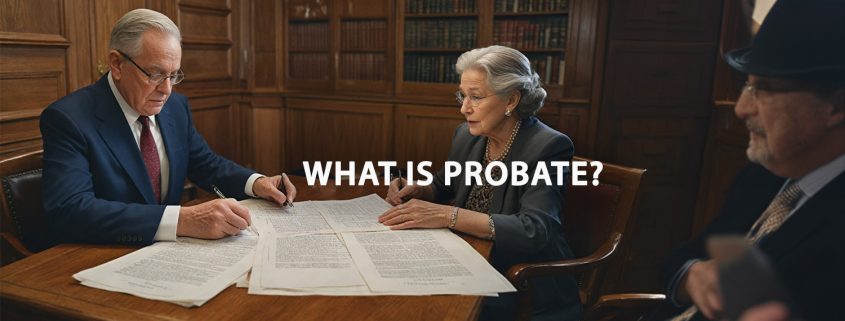What is Probate?
What is Probate?
Probate is the field of law that determines how an estate must be divided. Each state has its own laws and statutes requirements to determine if and how an estate must be probated. The probate court will supervise the process when a deceased person (a decedent) leaves assets to distribute, such as bank accounts, real estate, and financial investments with or without a will. The probate court provides the final ruling on the division and distribution of assets to beneficiaries.
In many cases, the decedent has established documentation, which contains instructions on how their assets should be distributed after death and designates in such documents who oversees implementing this process. This involves collecting the deceased’s assets to pay any remaining liabilities on their estate and distributing the assets to beneficiaries. Where a decedent fails to establish such documents while alive, State law and the probate courts will dictate how the estate is administered and to whom assets get distributed to.
Probate With a Will
A deceased person with a Will is known as a testator and he or she is deemed to have died “testate.” When a testator dies, the person designated as the executor under the Will is responsible for initiating the probate process. The probate process for a testate estate includes distributing the decedent’s assets according to the Will.
Probate Without a Will
When a person dies without a Will, a person is to have died intestate. An intestate estate can also occur when a written Will is presented to the probate court and the probate court has been deemed the Will to be invalid. The probate process for an intestate estate includes distributing the decedent’s assets according to State law.
What Is The Probate Process?
A probate court proceeding begins with the appointment of an administrator or executor to oversee the estate of the deceased person. Such personal is typically called the “personal representative.” The personal representative receives all legal claims against the estate and paying off the outstanding debts. Also, the personal representative is tasked with locating any legal heirs of the deceased, including surviving spouses, children, and parents. Then the probate court will assess what assets need to be distributed among the legal heirs and how to distribute them.
The probate process can take a long time to finalize and can become costly, therefore it is important to know whether a probate is required following the death of an individual. The more complex or contested the estate is the more time it will take to settle and distribute the assets. Furthermore, the proceedings of probate court are publicly recorded so avoiding probate would ensure that all settlements are done privately.
Bypassing Probate
If an estate is small enough to bypass the probate process, then the estate’s asset may be claimed using alternative legal actions, such as an affidavit. Also, some assets can bypass probate because beneficiaries have been initiated through contractual terms, such as pension plans, life insurance proceeds, 401 k plans, medical savings accounts, trusts, living trusts, and individual retirement accounts (IRA) that have designated beneficiaries. Furthermore, probate court can be bypassed if assets are jointly owned with a right of survivorship and also if a deceased person’s debts exceed their assets.
What Should You Do?
The probate process could be expensive and complex especially during a time of grief. Consider reaching out to a Trusts and Estates and/or Probate Attorney such as those at the Law Offices Of Jeffrey B. Kahn, P.C. We are always thinking of ways that our clients can save on taxes, trusts and estates planning, and probate matters. The tax attorneys at the Law Offices Of Jeffrey B. Kahn, P.C. located in Orange County (Irvine), Los Angeles and elsewhere in California are highly skilled in handling tax and probate matters and can effectively represent at all levels with the IRS and State Tax Agencies including criminal tax investigations and attempted prosecutions, undisclosed foreign bank accounts and other foreign assets, and unreported foreign income. Also, if you are involved in cannabis, check out what our cannabis tax attorney can do for you. Additionally, if you are involved in cryptocurrency, check out what a bitcoin tax attorney can do for you.


 Follow
Follow Follow
Follow
